Did you know that approximately 20% of pool owners neglect proper care and maintenance during the fall season, leading to costly repairs and potentially irreversible damage to their pools? To ensure that your pool survives the winter and remains in pristine condition for the next swimming season, it is crucial to follow a set of essential steps. By taking proactive measures to clear debris, balance water chemistry, lower the water level, protect pool equipment, and cover the pool securely, you can avoid potential problems and save yourself from unnecessary expenses. But what are these steps exactly, and why are they so important? Let’s dive in and explore the key Fall pool care strategies to ensure your pool’s survival during the winter months.
Key Takeaways
- Regularly clear debris from the pool to maintain cleanliness and prevent clogging of the filter system.
Test and balance the water chemistry, including chlorine levels, pH, alkalinity, and calcium hardness, to prevent damage and maintain optimal conditions. - Lower the water level and properly winterize the pool to prevent freezing and potential damage to the plumbing system.
- Clean and protect pool equipment, including the pump, filter, and heater, to ensure their longevity and proper functioning during the winter season.
- Securely cover the pool with a solid or mesh cover to prevent debris and sunlight from entering, and regularly inspect and maintain the cover for any damage or wear.
Clear Debris From the Pool
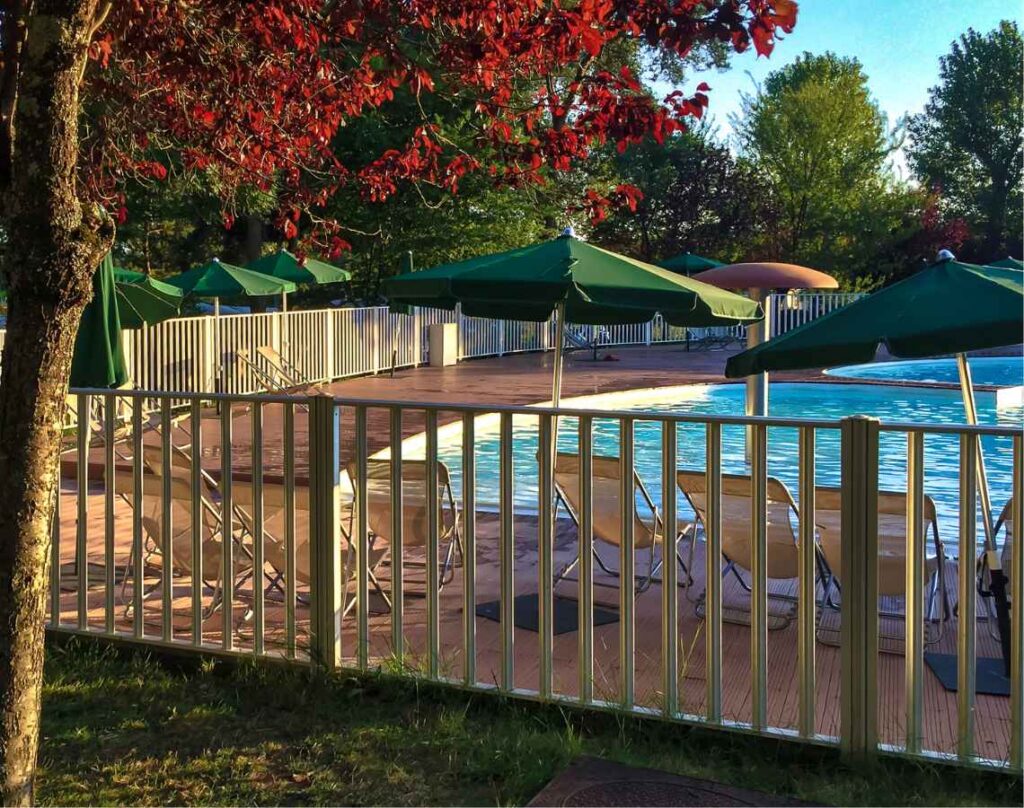
To ensure the cleanliness and optimal functioning of your pool, it is essential to promptly clear any debris that may have accumulated in it. Regular pool cleaning is a crucial part of pool maintenance, especially during the fall season. As leaves, twigs, and other debris fall from nearby trees, they can quickly find their way into your pool, causing clogs, poor filtration, and potential damage to your pool equipment.
Start by skimming the surface of the water with a pool net to remove any visible debris. Be thorough and pay attention to corners, steps, and along the pool walls where debris tends to accumulate. For smaller debris or particles that may have sunk to the bottom, a pool vacuum or automatic cleaner can be used to effectively remove them.
In addition to manual cleaning, it is also important to regularly check and clean your pool’s filter system. A clogged or dirty filter can hinder the circulation of water and reduce the effectiveness of your pool’s cleaning system. Follow the manufacturer’s instructions to clean or replace the filter as needed.
Balance the Water Chemistry
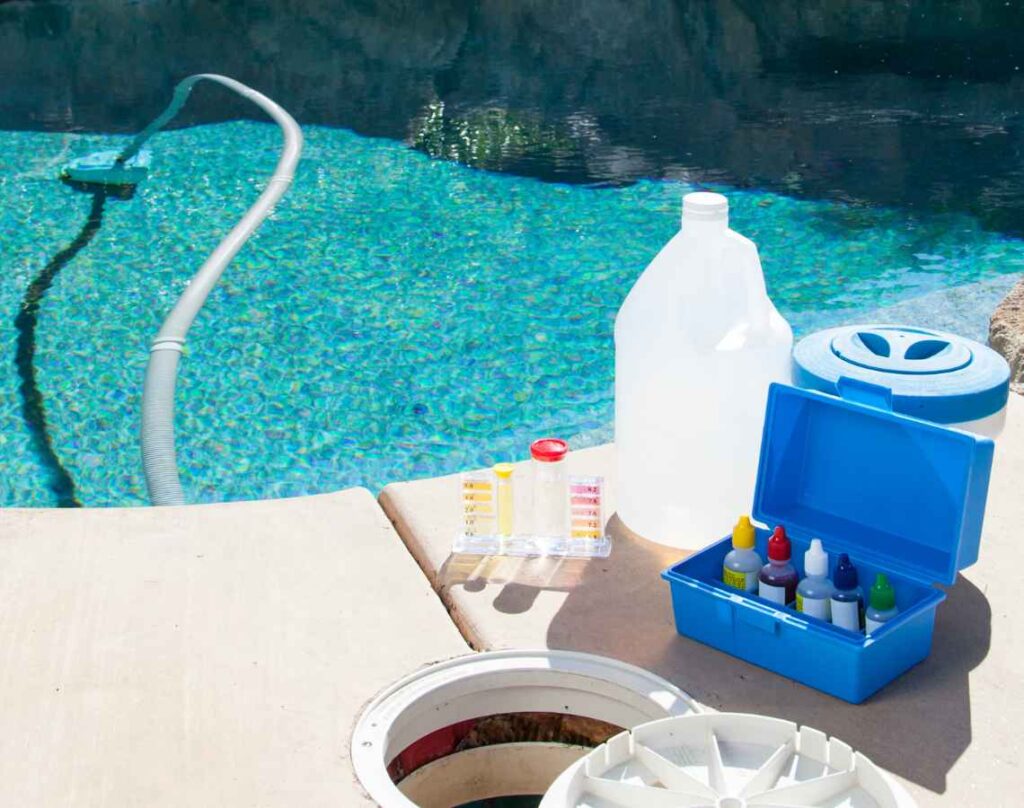
Now that you have cleared the debris from your pool, it is crucial to ensure that the water chemistry is balanced for optimal pool care. Properly balancing the water chemistry is an essential step in winter pool preparations and will help protect your pool from damage during the colder months. Maintaining the right chemical levels not only keeps the water safe for swimming but also prevents corrosion, algae growth, and equipment malfunction.
To begin, test the water using a reliable pool testing kit. Pay attention to the levels of chlorine, pH, alkalinity, and calcium hardness. Adjusting these levels will depend on your pool’s specific needs, so consult the manufacturer’s guidelines or seek professional advice if necessary.
Firstly, let’s focus on chlorine levels. It is recommended to maintain a chlorine level between 1-3 parts per million (ppm) during the winter season. This will prevent bacteria and algae growth, keeping the water clean and clear. Secondly, ensure that the pH level is between 7.2 and 7.6. A balanced pH level will prevent corrosion of pool surfaces and equipment.
Next, check the alkalinity. The ideal range for alkalinity is between 80-120 ppm. Proper alkalinity levels help stabilize the pH, preventing rapid fluctuations. Lastly, monitor the calcium hardness level, aiming for a range of 150-250 ppm. This prevents damage to pool surfaces and equipment caused by either low or high calcium levels.
Regularly testing and adjusting the water chemistry will ensure that your pool remains in optimal condition throughout the winter season. By maintaining proper chemical balance, you will enjoy a clean and safe pool when it’s time to open it again in the spring.
Lower the Water Level
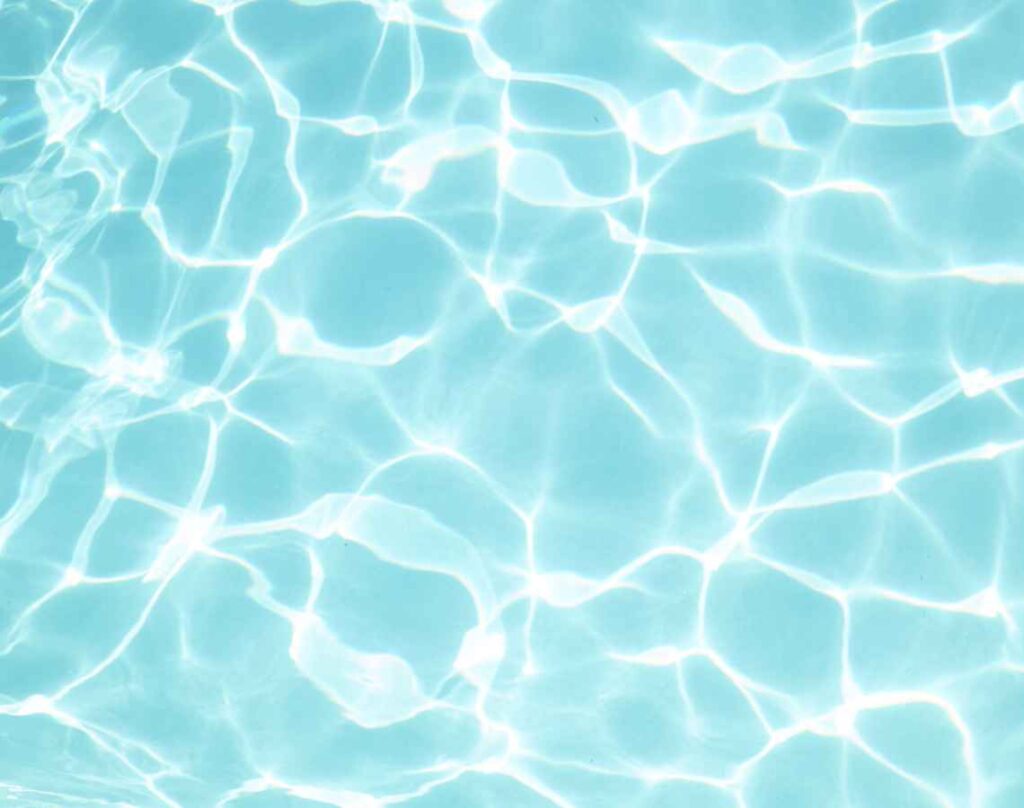
Consider lowering the water level in your pool as part of your fall pool care routine. Lowering the water level is an important step in preventing freezing and protecting your pool during the winter months. When temperatures drop below freezing, the water in your pool can expand and cause damage to the pool and its equipment. By lowering the water level, you reduce the risk of freezing and minimize potential damage.
To lower the water level, you can use a submersible pump or a hose to drain the excess water. Start by turning off the pool pump and filter system. Then, attach the submersible pump to a hose and place it in the deepest part of the pool. Turn on the pump and let it drain the water until the desired level is reached. Alternatively, you can connect a hose to a pool drain or skimmer and slowly drain the water out.
It is important to follow proper pool winterization techniques when lowering the water level. Make sure to shut off the pool’s main drain and skimmer valves to prevent any water from entering the plumbing system. Additionally, ensure that all pool equipment is properly winterized and protected from freezing temperatures.
Protect the Pool Equipment
An essential step in protecting your pool during the fall is to ensure the proper protection of the pool equipment. Winterizing your equipment is crucial to prevent damage and ensure it is ready for use when the warmer weather returns. Here are some important steps to follow for winterizing your equipment and maintaining your pool.
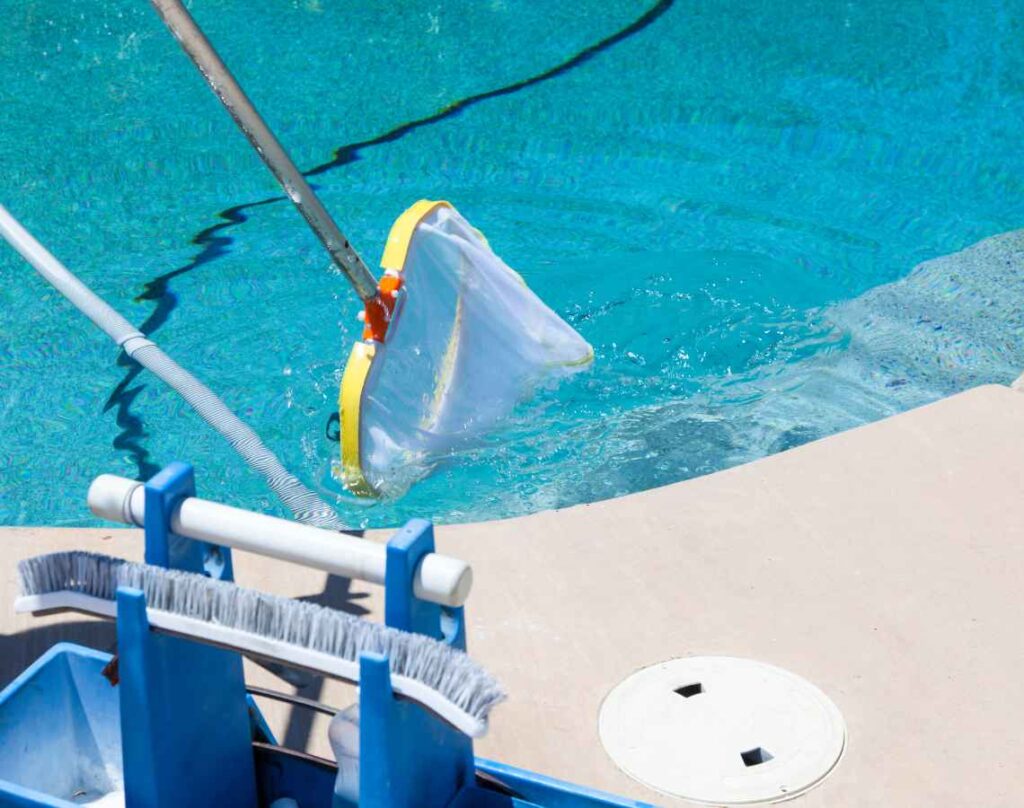
Start by cleaning and removing any debris from the pool equipment, including the pump, filter, and heater. This will prevent clogs and damage caused by winter weather. Next, drain the water from the equipment to prevent freezing and potential cracks. Be sure to follow the manufacturer’s instructions for proper draining.
After draining, it is essential to cover the equipment to protect it from the elements. Use a durable and weather-resistant cover to shield your pump, filter, and heater from snow, ice, and debris. Additionally, consider using insulated covers or blankets for added protection and energy efficiency.
Regular maintenance is also crucial during the winter months. Check on your equipment periodically to ensure it remains in good condition. Remove any snow or ice buildup, and inspect for any signs of damage or wear. Address any issues promptly to prevent further damage and costly repairs.
Cover the Pool Securely
Make sure to securely cover your pool to protect it from debris and maintain its cleanliness during the fall season. Proper pool cover maintenance is essential to ensure that your pool remains in good condition throughout the winter months.
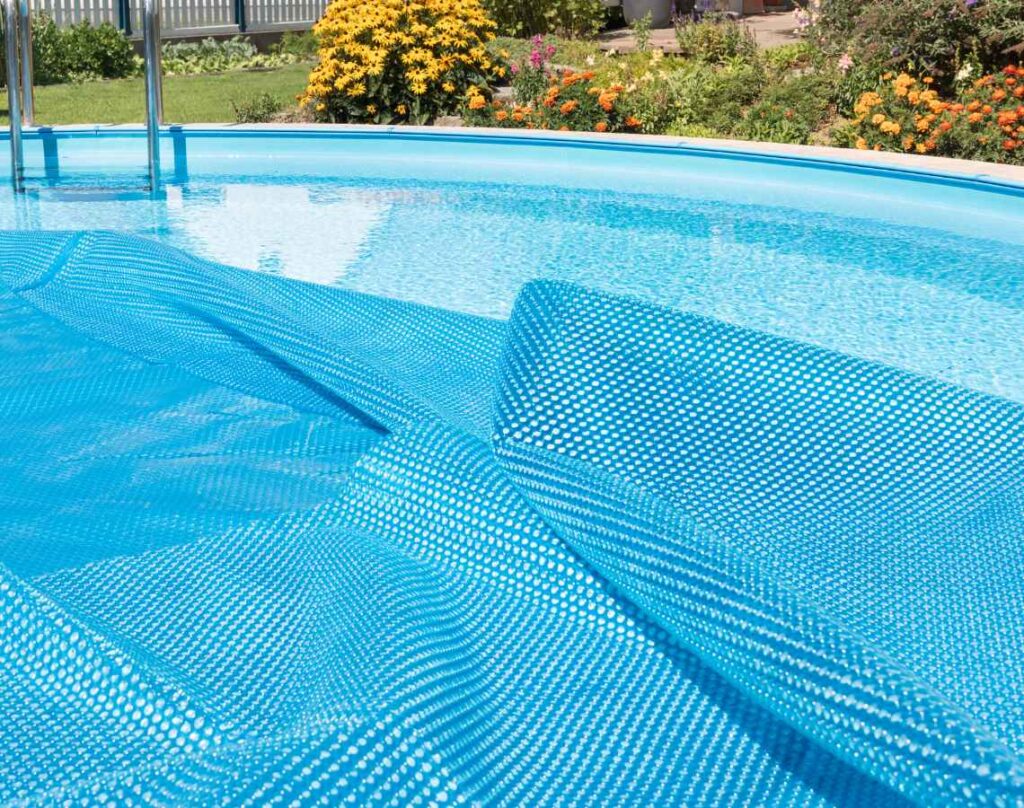
When choosing a cover for your pool, there are several winter pool cover options to consider. One option is a solid cover, which offers excellent protection against debris and prevents sunlight from entering the pool. This helps to inhibit algae growth and keeps the water clean. Another option is a mesh cover, which allows water to pass through while keeping out leaves and larger debris.
Once you have selected the appropriate cover, make sure to secure it tightly to the pool. This will prevent it from being blown off by strong winds and keep it in place throughout the season. Use cover clips or straps to secure the cover to the pool’s edges, ensuring a snug fit.
Regular pool cover maintenance is also crucial. Remove any leaves or debris that accumulate on the cover to prevent them from falling into the pool. Additionally, periodically check the cover for any signs of damage or wear and tear. Repair or replace the cover as needed to ensure maximum protection.
Frequently Asked Questions
How Often Should I Clean the Pool Cover During the Winter Season?
During the winter season, you should clean the pool cover regularly to prevent debris buildup and ensure proper winter pool maintenance. The cleaning frequency will depend on the amount of debris in your area.
Can I Use Regular Household Cleaners to Balance the Water Chemistry?
You can use regular household cleaners to balance the water chemistry in your pool. However, it’s important to consider the pros and cons of using them. Using natural cleaners is a better option for maintaining a healthy and safe pool environment.
Are There Any Specific Steps to Protect the Pool Equipment From Freezing Temperatures?
To protect your pool equipment from freezing temperatures during winter, follow these steps for winter maintenance. Properly cover the pool, drain water from the equipment, and use a pool antifreeze solution to prevent damage.
Is It Necessary to Drain the Pool Completely Before Covering It for the Winter?
No, it’s not necessary to drain the pool completely before covering it for the winter. You can simply use a winter pool cover and perform regular winter pool maintenance to ensure the pool survives the winter.
What Should I Do if I Notice Damage to the Pool Cover During the Winter Months?
If you notice damage to your pool cover during the winter months, it’s important to address it promptly. Repairing the pool cover can help maintain its effectiveness and prevent further damage to your pool.

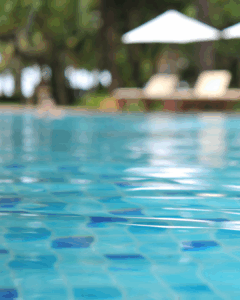

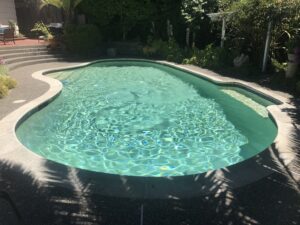
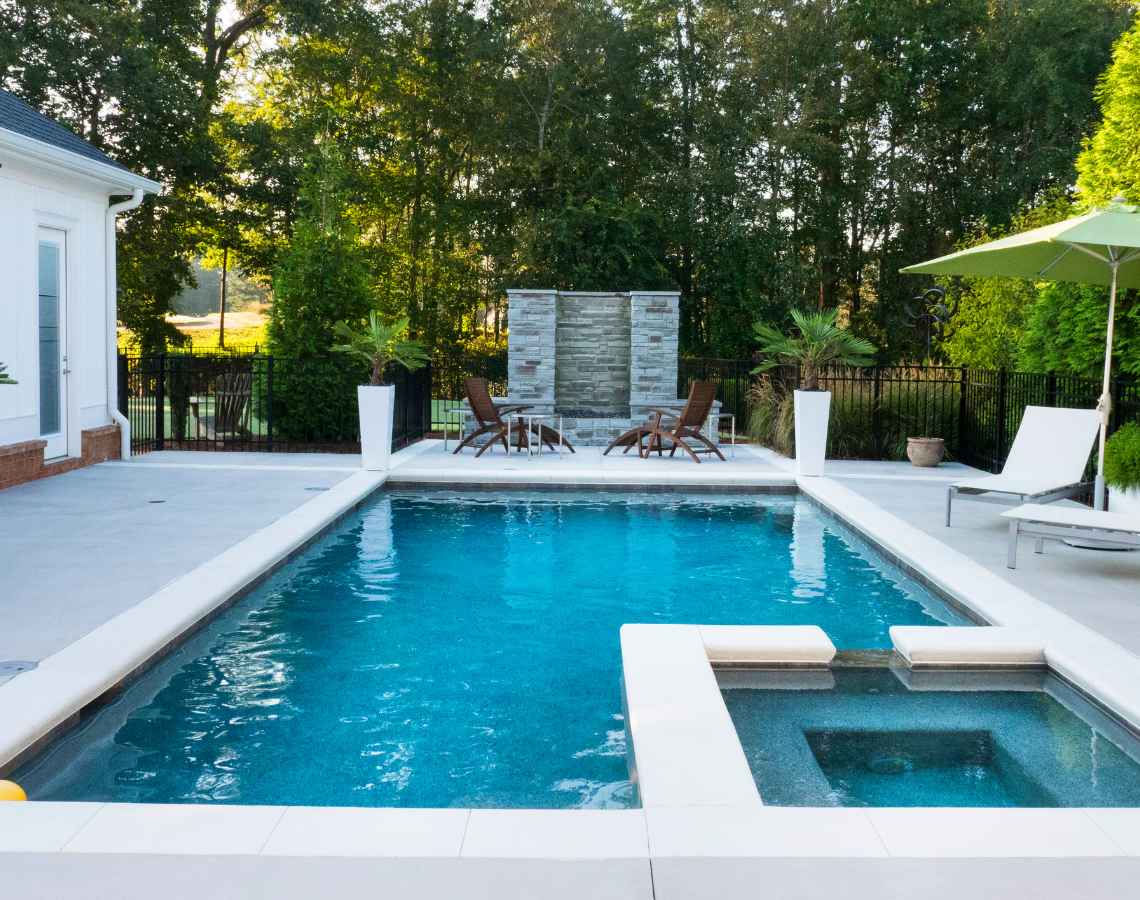

 Alex Cota
Alex Cota  Sophie Pekic
Sophie Pekic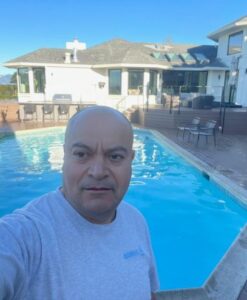 Rudy Reyes
Rudy Reyes  Mark Harlan
Mark Harlan Kevin Hall
Kevin Hall 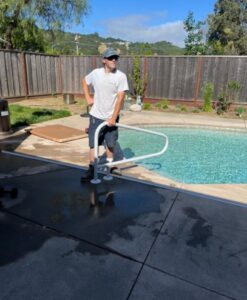 Howard (Howie) Van Lare
Howard (Howie) Van Lare  Chris Cavalerro
Chris Cavalerro 

 Betty Garmendina
Betty Garmendina George Wallace
George Wallace Zach Zastrow
Zach Zastrow Jorge Salazar Bernal
Jorge Salazar Bernal Mike Watson
Mike Watson Jane Ciuchta – Hired 2015
Jane Ciuchta – Hired 2015 Bruce Muir – Hired 2020
Bruce Muir – Hired 2020 David-Metzger – Hired 2014
David-Metzger – Hired 2014 Robin Clarke – Hired 2019
Robin Clarke – Hired 2019 Maddi Davidson – Hired 2022
Maddi Davidson – Hired 2022 John Albachten – Hired 2015
John Albachten – Hired 2015 Jay Bergmann – Hired 2023
Jay Bergmann – Hired 2023 Summer Venegas – Hired 2017
Summer Venegas – Hired 2017 Rebecca Jones – Hired 2015
Rebecca Jones – Hired 2015 Jane Doe – Hired 2014
Jane Doe – Hired 2014